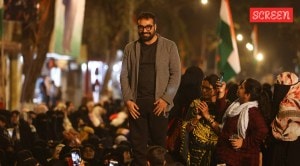Lanka President, PM agree to meet again
The first meeting between Sri Lanka’s Prime Minister and President since a power struggle erupted between them last week ended on Wedne...

The first meeting between Sri Lanka’s Prime Minister and President since a power struggle erupted between them last week ended on Wednesday with an agreement to meet again but apparently little else.
No breakthrough had been expected during their talks to try to end the crisis that has overshadowed Norwegian-backed efforts to get stalled peace talks with the island’s separatist Tamil rebels back on track.
‘‘After an exchange of views on events leading to the present situation, the President and the PM decided to move forward and continue the dialogue with all parties,’’ the offices of President Chandrika Kumaratunga and PM Ranil Wickremesinghe said in a joint statement.
‘‘It was planned to have a further meeting between the President and PM next week,’’ it said, adding the talks were ‘‘cordial and friendly’’. Bradman Weerakoon, Wickremesinghe’s Principal Secretary who attended the meeting, said: ‘‘The meeting went well.’’
It was the first time the two had met since Kumaratunga sacked three ministers and suspended Parliament on November 4 while Wickremesinghe was on a trip to Washington. She said Wickremesinghe was compromising national security by making too many concessions to win peace with the rebels from the minority Tamil community.
Wickremesinghe went to the meeting saying the President’s actions had put the peace bid in jeopardy, while Kumaratunga’s office said she wanted his views ‘‘on her call for a Grand Alliance of all national and patriotic forces’’.
The statement made no mention of those issues, and analysts and diplomats said if neither gives way an election was a possibility. ‘‘It’s like a Shakespearean drama that goes on and ends in an election,’’ said a European diplomat, who along with US and Indian diplomats was trying to bring the two together.
The crisis has overshadowed a visit by Norwegian Deputy Foreign Minister Vidar Helgesen and peace envoy Erik Solheim to try to arrange preliminary talks to pave the way for the rebels and government to resume negotiations to end the war.
The two leaders are elected separately and share power in an uneasy cohabitation where Wickremesinghe controls parliament but the President heads the Cabinet and has the power to sack ministers. Kumaratunga did just that to the Defence, Interior and Media ministers and suspended Parliament until November 19. She than called for a ‘‘national unity government’’. Wickremesinghe countered saying she had to reinstate the ministers or take over the peace talks.
Both are under pressure from supporters not to give in, with the PM’s backers saying his peace efforts are popular and pointing to his parliamentary majority, and Kumaratunga’s saying reinstating the ministers would be an admission of weakness.
The two are scions of political dynasties that have shared power in the island nation but have been bitter rivals for years. Despite that rivalry, hey are polite and friendly when they meet, said officials who have seen them together. (Reuters)
Photos





- 01
- 02
- 03
- 04
- 05


























